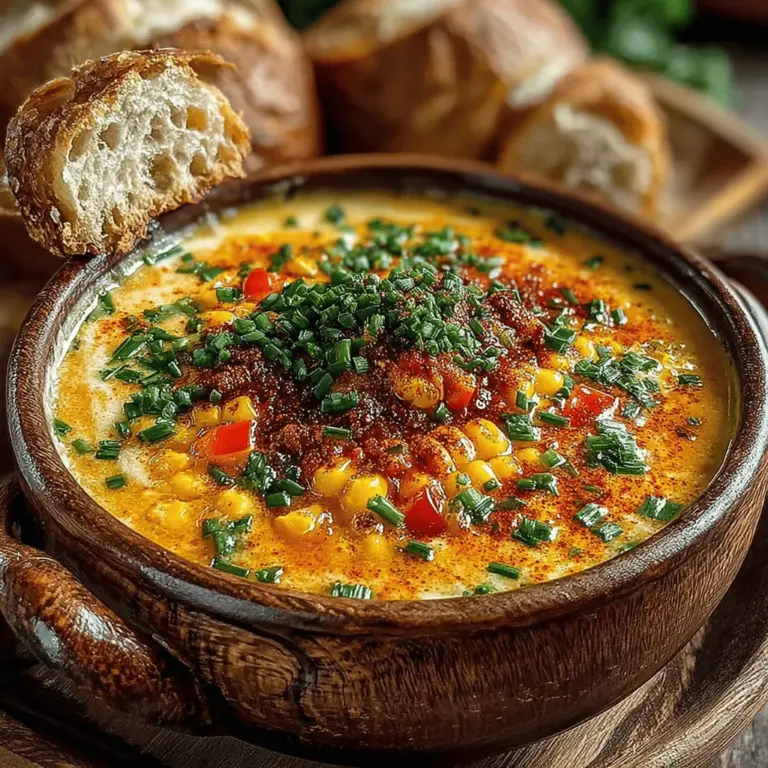Introduction
As the warm sun shines brightly and the days grow longer, summer cooking becomes an exhilarating adventure filled with vibrant, fresh ingredients. Nothing captures the essence of the season quite like a bowl of Creamy Summer Corn Chowder. This dish not only embodies the sweet, sun-kissed flavors of summer but also serves as a comforting staple that can be enjoyed by everyone at the table, from vegetarians to meat lovers.
Corn chowder is a dish that resonates with many cultures, often seen as a celebration of local produce and the heart of summer harvests. The creamy texture of the chowder, paired with the delightful crunch of fresh corn, creates an inviting combination that beckons for seconds. With its vibrant colors and rich flavors, this chowder stands out as a versatile dish perfect for lunch, dinner, or even as a starter for a summer gathering.
In this article, we’ll explore the history and significance of corn chowder, the benefits of using fresh ingredients, and provide a comprehensive guide to making the perfect Creamy Summer Corn Chowder Delight. From selecting the freshest corn to the final finishing touches, each step will ensure that your chowder is a delicious reflection of summer’s bounty.
The Essence of Corn Chowder
Corn chowder has deep roots in culinary traditions across the globe. Originating from Native American cuisine, it was traditionally made with corn, milk, and other local ingredients. Over time, various cultures have adapted the recipe, infusing their own regional flavors and ingredients. For example, New England clam chowder, which is perhaps one of the most famous variations, combines the sweetness of corn with the briny flavors of seafood, showcasing the versatility of this beloved dish.
When it comes to making corn chowder, the choice between fresh and canned corn can significantly impact both flavor and nutrition. Fresh corn, particularly when in season, is bursting with sweetness and has a crisp texture that canned corn simply cannot replicate. The flavor profile of fresh corn is also richer, thanks to its natural sugars that develop fully when harvested at the right time. Nutritionally, fresh corn is higher in vitamins and antioxidants, making it the superior choice for a health-conscious dish.
In addition to traditional recipes, there is ample room to adapt corn chowder to suit various dietary preferences. For those looking to avoid dairy, coconut milk or cashew cream can provide a luscious, creamy texture without compromising flavor. This adaptability not only makes corn chowder accessible to a broader audience but also encourages creativity in the kitchen.
Ingredients Overview
To create a mouthwatering Creamy Summer Corn Chowder Delight, the quality of your ingredients is paramount. Here’s a detailed overview of what you’ll need:
Fresh Corn Kernels
The star of the show, fresh corn kernels are essential for achieving the best flavor in your chowder. When selecting corn, look for ears with bright green husks and plump kernels. The kernels should be slightly tender and milky when pierced. The best time to enjoy fresh corn is during the height of summer when it’s sweetest and most abundant.
Yukon Gold Potatoes
These potatoes are ideal for chowder due to their creamy texture and buttery flavor. Yukon Golds hold their shape well during cooking while also providing a thick, velvety base to the chowder. Their natural creaminess enhances the overall texture of the dish, making each spoonful delightful.
Aromatics
Aromatic vegetables like onion, garlic, and bell pepper are crucial for building the flavor foundation of your chowder. Onions add sweetness, garlic brings depth, and bell peppers contribute a hint of earthiness. Together, they create a robust flavor profile that elevates the dish.
Broth and Cream
The choice of broth can significantly affect the taste of your chowder. Vegetable broth is a popular option for a vegetarian version, while chicken broth can add a savory depth for non-vegetarians. When it comes to creaminess, heavy cream offers a rich, indulgent texture, but for a lighter option, coconut milk can provide an equally satisfying result, especially in dairy-free versions.
Seasonings
The right seasonings can transform your chowder from good to extraordinary. Paprika adds a subtle smokiness, while thyme introduces a hint of earthiness that complements the sweetness of the corn. These spices work together to create a well-rounded flavor profile that is both comforting and refreshing.
Optional Ingredients
For those who enjoy a little extra flavor, consider adding crispy bacon bits for a savory crunch. Fresh herbs, such as chives or parsley, can be used as a garnish, adding a pop of color and a burst of freshness to each serving.
Preparation Steps for a Perfect Chowder
Now that you have gathered all your ingredients, it’s time to dive into the preparation process. The following steps will guide you through making the perfect Creamy Summer Corn Chowder Delight, ensuring that every bite is packed with flavor and a taste of summer.
1. Prep the Corn: Start by husking the fresh corn and removing the kernels from the cob. You can do this by standing the cob upright in a bowl and cutting downwards with a sharp knife. This method will help prevent the kernels from scattering everywhere. Set aside the kernels for later use.
2. Chop the Vegetables: Dice the onion, bell pepper, and mince the garlic. Uniform cuts will ensure even cooking and a consistent texture throughout the chowder.
3. Cook the Aromatics: In a large pot or Dutch oven, heat a drizzle of olive oil or butter over medium heat. Add the diced onion and bell pepper, sautéing until they become translucent, about 5-7 minutes. Stir in the minced garlic and cook for an additional minute, allowing the flavors to meld.
4. Add the Potatoes: Next, incorporate the diced Yukon Gold potatoes into the pot, stirring to combine with the aromatics. Cook for a few minutes to allow the potatoes to absorb the flavors from the aromatics.
5. Pour in the Broth: Add your choice of vegetable or chicken broth to the pot, ensuring the ingredients are fully submerged. Bring the mixture to a gentle boil, then reduce the heat and let it simmer until the potatoes are tender, about 15-20 minutes.
6. Incorporate the Corn: Once the potatoes are cooked through, stir in the fresh corn kernels. Let the chowder simmer for an additional 5-10 minutes, allowing the corn to soften and release its natural sweetness into the broth.
7. Cream it Up: Finally, stir in your choice of heavy cream or coconut milk, adjusting the consistency to your liking. Season with paprika, thyme, salt, and pepper to taste. Continue to cook for a few more minutes, allowing the flavors to meld together beautifully.
With these initial steps, you are well on your way to creating a delicious and comforting bowl of Creamy Summer Corn Chowder Delight. The next section will delve deeper into the finishing touches and presentation tips to elevate your chowder to the next level.
{{image_2}}
Prepping the Corn
When it comes to crafting a flavorful Creamy Summer Corn Chowder, the star ingredient is undoubtedly fresh corn. To achieve the best results, it’s essential to prep the corn correctly. Begin by selecting the freshest ears of corn you can find; look for bright green husks and plump kernels.
How to Cut Corn Off the Cob
1. Stand the Corn Upright: Place the ear of corn vertically in a bowl or on a cutting board. This prevents kernels from flying everywhere as you cut.
2. Cut Downward: Using a sharp knife, slice down the sides of the corn cob, removing the kernels. Aim to cut just deep enough to catch the kernels without damaging the cob.
3. Scrape for Corn Milk: After cutting off the kernels, take the back of the knife and scrape down the cob to extract the corn milk. This milk will add extra sweetness and flavor to your chowder, making it even creamier.
By following these techniques, you’ll not only maximize the corn yield but also enhance the chowder’s overall taste.
Sautéing Aromatics
Sautéing is a foundational cooking technique in many recipes, including our chowder. It helps build layers of flavor that elevate the dish.
The Importance of Sautéing
When you sauté onions, garlic, and other aromatics, you’re allowing their natural sugars to caramelize and develop a rich flavor profile.
Signs of Perfectly Sautéed Vegetables
To achieve the perfect sauté:
– Translucent Onions: Look for onions that become translucent, indicating they are just starting to soften.
– Golden Edges: A slight golden color on the edges signals that they are caramelizing properly.
– Aromatic Scents: The kitchen will fill with delightful aromas, a clear sign that the flavors are developing beautifully.
Sauté these aromatics in a bit of olive oil or butter, stirring frequently to prevent burning, before adding your other ingredients.
Incorporating Vegetables
Once your aromatics are perfectly sautéed, it’s time to incorporate the remaining vegetables. This is where you can get creative with your chowder.
Combining Ingredients for Optimal Flavor Absorption
Add the diced potatoes and corn kernels to the pot after the aromatics. Stir well to coat them in the flavorful oil and aromatics. This step is crucial for ensuring that the potatoes absorb the sautéed flavors, enhancing the overall taste of your chowder.
Additional Vegetables
Consider adding bell peppers, shredded carrots, or even diced zucchini if you want to incorporate more texture and nutrition. The key is to cut everything into uniform pieces, which ensures even cooking and a pleasant mouthfeel in your chowder.
Simmering the Chowder
The simmering process is vital for melding flavors and ensuring that your vegetables are cooked just right.
How to Simmer
1. Add Broth: Pour in vegetable broth or chicken broth, ensuring it covers all the vegetables.
2. Bring to a Boil: Allow the mixture to come to a gentle boil, then reduce the heat to a simmer.
3. Cooking Time: Let the chowder simmer for about 15-20 minutes. The potatoes should be fork-tender but not mushy. Stir occasionally to prevent sticking.
What to Look For
During simmering, keep an eye on the texture of the potatoes. They should be soft enough to break apart easily with a fork but still hold their shape. This balance is key to achieving that perfect chowder consistency.
Creating a Creamy Finish
To transform your simmered vegetable medley into a true chowder, you’ll need to add cream or a dairy-free alternative.
Impact of Adding Cream or Coconut Milk
When you stir in heavy cream or coconut milk, the chowder takes on a luxurious, creamy texture. This addition not only enriches the flavor but also creates a velvety mouthfeel that makes every spoonful satisfying.
Tips for Creamy Chowder
– Add Gradually: Stir in the cream or coconut milk gradually, allowing it to mix thoroughly without curdling.
– Heat Gently: Avoid boiling the chowder after adding the cream, as high heat can cause it to separate.
Blending Techniques
The texture of chowder can vary based on personal preference. Whether you like it chunky or smooth, there are blending techniques to suit your style.
Achieving Different Textures
– Chunky Chowder: For those who prefer a heartier texture, simply leave the chowder as is after simmering and add a few additional kernels of corn for bites of sweetness.
– Smooth Chowder: If you desire a creamy, velvety consistency, use an immersion blender to blend a portion of the chowder until smooth. Alternatively, transfer half of the chowder to a regular blender, blend until smooth, and then return it to the pot.
Experiment with these techniques to find your perfect texture, creating a chowder that delights your palate.
Serving Suggestions
Now that your Creamy Summer Corn Chowder is ready, let’s talk about how to serve it to elevate your dining experience.
Accompaniments that Enhance Chowder
– Crusty Bread: Serve the chowder with a side of crusty artisan bread or warm cornbread for dipping.
– Herb Garnish: Top each bowl with a sprinkle of fresh herbs such as chives, parsley, or cilantro for a pop of color and freshness.
– Cheese Crumbles: A sprinkle of crumbled feta or cheddar can add a savory tang to the chowder.
Pairing the chowder with a light salad or grilled vegetables can also complement its rich flavors.
Nutritional Benefits of Corn Chowder
This Creamy Summer Corn Chowder is not just delicious; it’s also packed with nutritional benefits.
Nutritional Components
– Corn: Rich in fiber, vitamins B and C, and antioxidants, corn supports heart health and digestive function. It’s also a good source of energy.
– Potatoes: They provide potassium, vitamin C, and are a great source of complex carbohydrates, making the chowder filling and satisfying.
– Vegetables: Any added vegetables contribute additional vitamins, minerals, and fiber, enhancing the dish’s overall health profile.
Dietary Considerations
This chowder can easily fit into various dietary lifestyles:
– Vegetarian: Use vegetable broth and dairy-free cream.
– Gluten-Free: Ensure that your broth is gluten-free, and you’re all set.
– Dairy-Free: Substitute heavy cream with coconut milk or a plant-based alternative.
Seasonal Variations and Pairings
One of the best aspects of the Creamy Summer Corn Chowder is its adaptability to seasonal ingredients.
Seasonal Adaptations
– Summer Variations: Incorporate zucchini, diced tomatoes, or bell peppers to introduce fresh summer flavors. These veggies not only enhance the taste but also add vibrant colors to your chowder.
– Garnishing Ideas: Top with seasonal herbs like basil in the summer or thyme in the fall for a delightful twist.
Recommended Sides and Beverages
– Sides: Pair with a simple green salad or grilled seafood for a well-rounded meal.
– Beverages: A chilled white wine or a refreshing iced tea can complement the chowder beautifully.
Conclusion
In conclusion, the Creamy Summer Corn Chowder Delight is a celebration of seasonal ingredients that brings comfort and satisfaction to any table. With its rich flavors, creamy texture, and versatile nature, this recipe allows home cooks to explore the joys of cooking with fresh produce.
As you experiment with this recipe, consider the various adaptations and serving suggestions that can enhance your chowder experience. Cooking is not just about feeding ourselves; it’s about creating lasting memories with loved ones. So, gather your ingredients, let your creativity flow, and enjoy the process of making this delightful chowder. Share it with friends and family, and relish in the joy of homemade meals that warm the heart.


